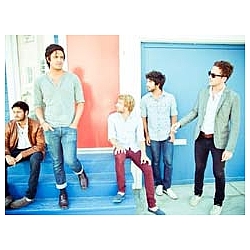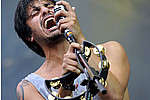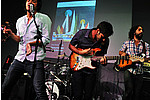Young the Giant summon the same spirit that made Failure and Hum so incredibly awesome in the early '90s. There's an ethereal pop sensibility throughout Young the Giant's self-titled debut album (Available 10/26), but it's coupled with a vibrant lyrical edge. Songs like "Guns Out" sail into their own realm of "alternative" guided by Sameer Gadhia's pristinely potent pipes and intriguing melodies. This is the next phase of space rock, and Young the Giant are ready to blast listeners off to a lush sonic galaxy.
Young the Giant singer Sameer Gadhia sat down with ARTISTdirect.com editor and Dolor author Rick Florino for an exclusive interview about the band's debut, L.A.'s affect on the record, endless summers and so much more.
Did you approach the album with a cohesive vision for the start or did it all come together in the studio?
I think we approached it as a whole vision that transformed into something else. We really did want the songs to all fit together in a bigger context. It wasn't overly pre-meditated though. We wrote about 30 tracks for the album. We enjoy some of those B-sides; they just don't make sense for the whole idea of the CD.
Where do you typically come from lyrically?
It's a bit of my own experiences as well as others' experiences. When you live in a place really high concentration, you get to listen to other people's stories and find out what's ticking in the place that you're at. A lot of the writing we did was heavily influenced by the beach and us living in Newport together for a long time. I think that's where summer-y feel comes in, and the dreamy element comes later. That was all the writing that we did in Los Angeles. It encompasses the idea of the nighttime ruling all in Los Angeles as well as the indistinguishability between dreams and reality when you're trying to live the Hollywood lifestyle. Sometimes, I'll enjoy the emotions, personalities and the relationships between two characters in a book I'm reading at the time too.
What's the story behind "Guns Out?"
I envisioned a nighttime drive in Los Angeles with a romantic couple just trying to get away from the doldrums of the city life. It's essentially past experiences of relationships, and how relationships can become a fight sometimes, but that fight can be the real spark and passion between two people. The chorus switches off between "You'll drive in my car" and "I'll drive in my car," and they don't really care where they're going as long as they're together and they don't have to follow suit with what other people expect of them or other people expect a relationship to be. More than anything, I wanted to have that idea of a really dreamy quality. The lyrics and vowels work physically, rhythmically and sonically with what's going on with the percussion as well as the guitar. We tried to keep it relatively open.
Do you tend to read a lot while you're writing?
I most definitely tend to read a lot. When you're in writing mode, all you're doing is essentially writing. You can experience life by going out and doing things, which is also something great that you need to do. I do love to read, and it works really well when it crosses over. I read a lot of Ernest Hemmingway. At the time of the album, I was reading a lot of Milan Kundera. He's a Franco-Czech writer. He wrote a lot about Soviet occupation in the Czech Republic and the beginning stages of communism, moving on to trying to erase people that were a part of the infrastructure. The song I got on the album is essentially about old things being buried, and eventually the things that are buried will rise up and be un-buried by themselves just from wind or normal things. I guess I did get some influence from some of Kundera's work directly with the lyrics. Hemmingway did really help me out. It was just his funny disposition and his real novel look on what it is to be a struggling artist down and out, but how amazingly great and fulfilling those times are. We all circulate books. All of us are reading all the time. The book that I got in my hands was A Moveable Feast, which was released posthumously. It was a diary of his life in the '20s in Paris. He was friends with F. Scott Fitzgerald and James Joyce, and they were all struggling all the time. They could afford drinks and fancy dinners, but they didn't have any savings at the time. I really drew from that and found that very appealing for us.
If your album were a movie, what would it be?
Aesthetically and visually, I'd say the first half of the album carrying into the middle has more of a beach, daytime sunny feel of carelessness. It's the idea of the eternal summer. The Endless Summer helps a lot. Our guitarist Jake is an avid surfer and he does find a lot of his guitar tones to be synonymous with the sounds of the ocean. I think later on everything becomes a little darker and more of a cityscape. It's living in L.A.—the grimy parts of it but the real passionate elements as well. The general flow was that transition of day into night for us.
Have you heard Young the Giant yet?
Write a comment
Young The Giant News
| Title | Date | ||
|---|---|---|---|
| 1 | Young The Giant Psyched About Their VMA Bump Young the Giant couldn't believe the huge crowd they drew when they played on one of the main stages at the Austin City Limits festival last weekend. … | September 21, 2011 | |
| 2 | Young The Giant To Make VMA Performance Debut MTV has a history of providing up-and-coming acts with a huge stage at the annual Video Music Awards. In recent years, everyone from Nicki Minaj to … | August 3, 2011 |



